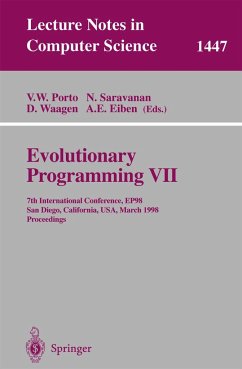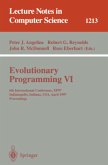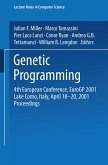Evolutionary Programming VII
7th International Conference, EP98, San Diego, California, USA, March 25-27, 1998 Proceedings
Herausgegeben:Porto, V.W.; Saravanan, N.; Waagen, D.; Eiben, A.E.
Evolutionary Programming VII
7th International Conference, EP98, San Diego, California, USA, March 25-27, 1998 Proceedings
Herausgegeben:Porto, V.W.; Saravanan, N.; Waagen, D.; Eiben, A.E.
- Broschiertes Buch
- Merkliste
- Auf die Merkliste
- Bewerten Bewerten
- Teilen
- Produkt teilen
- Produkterinnerung
- Produkterinnerung
This book constitutes the thoroughly refereed post-conference proceedings of the 7th International Conference on Evolutionary Programming, EP98, held in San Diego, CA, USA, in March 1998. The volume presents 81 revised full papers selected from an overwhelming number of submissions. The papers are organized in topical sections on economics, emergence and complex systems; issues and innovations in evolutionary computation; applications; evolution-based approaches to engineering design; examining representations and operators; evolutionary computation theory; evolutionary computation and…mehr
Andere Kunden interessierten sich auch für
![Evolutionary Programming VI Evolutionary Programming VI]() Evolutionary Programming VI39,99 €
Evolutionary Programming VI39,99 €![Introduction to Evolutionary Computing Introduction to Evolutionary Computing]() Agoston E. EibenIntroduction to Evolutionary Computing53,49 €
Agoston E. EibenIntroduction to Evolutionary Computing53,49 €![Evolutionary Computing Evolutionary Computing]() FogartyEvolutionary Computing39,99 €
FogartyEvolutionary Computing39,99 €![Foundations of Genetic Algorithms Foundations of Genetic Algorithms]() Alden H. Wright / Michael D. Vose / Kenneth A. De Jong / Lothar M. Schmitt (eds.)Foundations of Genetic Algorithms39,99 €
Alden H. Wright / Michael D. Vose / Kenneth A. De Jong / Lothar M. Schmitt (eds.)Foundations of Genetic Algorithms39,99 €![Genetic and Evolutionary Computation - GECCO 2004 Genetic and Evolutionary Computation - GECCO 2004]() Kalyanmoy Deb / Riccardo Poli / Wolfgang Banzhaf / Hans-Georg Beyer / Edmund Burke / Paul Darwen / Dipankar Dasgupta / Dario Floreano / James Foster / Mark Harman / Owen Holland / Pier Luca Lanzi / Lee Spector / A. TettamanziGenetic and Evolutionary Computation - GECCO 200439,99 €
Kalyanmoy Deb / Riccardo Poli / Wolfgang Banzhaf / Hans-Georg Beyer / Edmund Burke / Paul Darwen / Dipankar Dasgupta / Dario Floreano / James Foster / Mark Harman / Owen Holland / Pier Luca Lanzi / Lee Spector / A. TettamanziGenetic and Evolutionary Computation - GECCO 200439,99 €![Genetic Programming Genetic Programming]() Julian Miller / Marco Tomassini / Pier L. Lanzi / Conor Ryan / Andrea G.B. Tettamanzi / W.B. Langdon (eds.)Genetic Programming39,99 €
Julian Miller / Marco Tomassini / Pier L. Lanzi / Conor Ryan / Andrea G.B. Tettamanzi / W.B. Langdon (eds.)Genetic Programming39,99 €![The Theory of Evolution Strategies The Theory of Evolution Strategies]() Hans-Georg BeyerThe Theory of Evolution Strategies112,99 €
Hans-Georg BeyerThe Theory of Evolution Strategies112,99 €-
-
-
This book constitutes the thoroughly refereed post-conference proceedings of the 7th International Conference on Evolutionary Programming, EP98, held in San Diego, CA, USA, in March 1998.
The volume presents 81 revised full papers selected from an overwhelming number of submissions. The papers are organized in topical sections on economics, emergence and complex systems; issues and innovations in evolutionary computation; applications; evolution-based approaches to engineering design; examining representations and operators; evolutionary computation theory; evolutionary computation and biological modeling; particle swarm; and combinations of evolutionary and neural computation.
The volume presents 81 revised full papers selected from an overwhelming number of submissions. The papers are organized in topical sections on economics, emergence and complex systems; issues and innovations in evolutionary computation; applications; evolution-based approaches to engineering design; examining representations and operators; evolutionary computation theory; evolutionary computation and biological modeling; particle swarm; and combinations of evolutionary and neural computation.
Produktdetails
- Produktdetails
- Lecture Notes in Computer Science 1447
- Verlag: Springer / Springer Berlin Heidelberg / Springer, Berlin
- Artikelnr. des Verlages: 978-3-540-64891-8
- 1998.
- Seitenzahl: 868
- Erscheinungstermin: 5. August 1998
- Englisch
- Abmessung: 244mm x 170mm x 47mm
- Gewicht: 1212g
- ISBN-13: 9783540648918
- ISBN-10: 3540648917
- Artikelnr.: 09243935
- Herstellerkennzeichnung
- Springer-Verlag GmbH
- Tiergartenstr. 17
- 69121 Heidelberg
- ProductSafety@springernature.com
- Lecture Notes in Computer Science 1447
- Verlag: Springer / Springer Berlin Heidelberg / Springer, Berlin
- Artikelnr. des Verlages: 978-3-540-64891-8
- 1998.
- Seitenzahl: 868
- Erscheinungstermin: 5. August 1998
- Englisch
- Abmessung: 244mm x 170mm x 47mm
- Gewicht: 1212g
- ISBN-13: 9783540648918
- ISBN-10: 3540648917
- Artikelnr.: 09243935
- Herstellerkennzeichnung
- Springer-Verlag GmbH
- Tiergartenstr. 17
- 69121 Heidelberg
- ProductSafety@springernature.com
The cumulative consensus of cognitive agents in scenarios: A framework for evolutionary processes in semantic memory.- Preferential partner selection in evolutionary labor markets: A study in agent-based computational economics.- Subspace pursuit for exploratory modeling.- Complete classes of strategies for the Classical Iterated Prisoner's Dilemma.- Evolutionary computing in multi-agent environments: Operators.- Evaluation of a simple host-parasite genetic algorithm.- Testing three paradigms for evolving groups of cooperative, simple agents.- Acquisition of general adaptive features by evolution.- Hybrid interior-lagrangian penalty based evolutionary optimization.- GA-Optimal fitness functions.- Scaling up evolutionary programming algorithms.- Short notes on the schema theorem and the building block hypothesis in genetic algorithms.- A superior evolutionary algorithm for 3-SAT.- Evolvable hardware control for dynamic reconfigurable and adaptive computing.- Evolutionary programming strategies with self-adaptation applied to the design of rotorcraft using parallel processing.- Optimization of thinned phased arrays using evolutionary programming.- Evolutionary domain covering of an inference system for function approximation.- Learning to re-engineer semantic networks using cultural algorithms.- Integration of slicing methods into a Cultural Algorithm in order to assist in large-scale engineering systems design.- Genetic search for object identification.- Fuzzy cultural algorithms with evolutionary programming.- Culturing evolution strategies to support the exploration of novel environments by an intelligent robotic agent.- Skeuomorphs and cultural algorithms.- Sphere operators and their applicability for constrained parameter optimization problems.- Numeric mutation as an improvement to symbolic regression in genetic programming.- Variable-dimensional optimization with evolutionary algorithms using fixed-length representations.- On making problems evolutionarily friendly part 1: Evolving the most convenient representations.- On making problems evolutionarily friendly part 2: Evolving the most convenient coordinate systems within which to pose (and solve) the given problem.- An experimental investigation of self-adaptation in evolutionary programming.- On the application of evolutionary pattern search algorithms.- The schema theorem and the misallocation of trials in the presence of stochastic effects.- On the Explorative power of ES/EP-like algorithms.- Resampling and its avoidance in genetic algorithms.- Evolutionary search for minimal elements in partially ordered finite sets.- Tailoring mutation to landscape properties.- A genetic programming methodology for missile countermeasures optimization under uncertainty.- Evolutionary algorithms for vertex cover.- An evolutionary self-learning methodology: Some preliminary results from a case study.- Evolving IIR filters in multipath environments.- Fuzzy partition and input selection by genetic algorithms for designing fuzzy rule-based classification systems.- Evolving nonlinear controllers for backing up a truck-and-trailer using evolutionary programming.- Reconstruction of DNA sequence information from a simulated DNA chip using evolutionary programming.- Using programmatic motifs and genetic programming to classify protein sequences as to cellular location.- Fully automated and rapid flexible docking of inhibitors covalently bound to serine proteases.- Microtubule networks as a medium for adaptive information processing.- Evolve IV: A metabolically-based artificial ecosystem model.- Sex, mate selection, and evolution.- Finding low energy conformations of atomic clusters using evolution strategies.- Estimating the distribution of neural connections in the saccadic system using a biologically plausible learning rule Preliminary results.- Evolutionary algorithms combined with deterministic search.- Steady state memetic algorithm for partial shape matching.- A fully characterized te
The cumulative consensus of cognitive agents in scenarios: A framework for evolutionary processes in semantic memory.- Preferential partner selection in evolutionary labor markets: A study in agent-based computational economics.- Subspace pursuit for exploratory modeling.- Complete classes of strategies for the Classical Iterated Prisoner's Dilemma.- Evolutionary computing in multi-agent environments: Operators.- Evaluation of a simple host-parasite genetic algorithm.- Testing three paradigms for evolving groups of cooperative, simple agents.- Acquisition of general adaptive features by evolution.- Hybrid interior-lagrangian penalty based evolutionary optimization.- GA-Optimal fitness functions.- Scaling up evolutionary programming algorithms.- Short notes on the schema theorem and the building block hypothesis in genetic algorithms.- A superior evolutionary algorithm for 3-SAT.- Evolvable hardware control for dynamic reconfigurable and adaptive computing.- Evolutionary programming strategies with self-adaptation applied to the design of rotorcraft using parallel processing.- Optimization of thinned phased arrays using evolutionary programming.- Evolutionary domain covering of an inference system for function approximation.- Learning to re-engineer semantic networks using cultural algorithms.- Integration of slicing methods into a Cultural Algorithm in order to assist in large-scale engineering systems design.- Genetic search for object identification.- Fuzzy cultural algorithms with evolutionary programming.- Culturing evolution strategies to support the exploration of novel environments by an intelligent robotic agent.- Skeuomorphs and cultural algorithms.- Sphere operators and their applicability for constrained parameter optimization problems.- Numeric mutation as an improvement to symbolic regression in genetic programming.- Variable-dimensional optimization with evolutionary algorithms using fixed-length representations.- On making problems evolutionarily friendly part 1: Evolving the most convenient representations.- On making problems evolutionarily friendly part 2: Evolving the most convenient coordinate systems within which to pose (and solve) the given problem.- An experimental investigation of self-adaptation in evolutionary programming.- On the application of evolutionary pattern search algorithms.- The schema theorem and the misallocation of trials in the presence of stochastic effects.- On the Explorative power of ES/EP-like algorithms.- Resampling and its avoidance in genetic algorithms.- Evolutionary search for minimal elements in partially ordered finite sets.- Tailoring mutation to landscape properties.- A genetic programming methodology for missile countermeasures optimization under uncertainty.- Evolutionary algorithms for vertex cover.- An evolutionary self-learning methodology: Some preliminary results from a case study.- Evolving IIR filters in multipath environments.- Fuzzy partition and input selection by genetic algorithms for designing fuzzy rule-based classification systems.- Evolving nonlinear controllers for backing up a truck-and-trailer using evolutionary programming.- Reconstruction of DNA sequence information from a simulated DNA chip using evolutionary programming.- Using programmatic motifs and genetic programming to classify protein sequences as to cellular location.- Fully automated and rapid flexible docking of inhibitors covalently bound to serine proteases.- Microtubule networks as a medium for adaptive information processing.- Evolve IV: A metabolically-based artificial ecosystem model.- Sex, mate selection, and evolution.- Finding low energy conformations of atomic clusters using evolution strategies.- Estimating the distribution of neural connections in the saccadic system using a biologically plausible learning rule Preliminary results.- Evolutionary algorithms combined with deterministic search.- Steady state memetic algorithm for partial shape matching.- A fully characterized te








